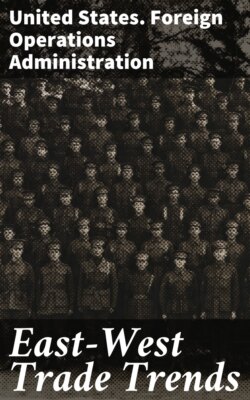Читать книгу East-West Trade Trends - United States. Foreign Operations Administration - Страница 16
На сайте Литреса книга снята с продажи.
Has Stalin Been Overruled?
ОглавлениеTable of Contents
In early 1954 the situation could be summarized something like this:
The Soviet-bloc rulers have put on a more affable diplomatic face and made a number of conciliatory gestures to the Western world without altering their fundamental hostile objectives, and they have made a great fanfare about supplying more consumer goods to their people without basically changing their war-oriented economy.
The conciliatory diplomatic tactics of Stalin’s successors have sometimes been called a “peace offensive,” but the term is hardly justified. Since last June the peaceful sounds have alternated curiously with renewals of the old name-calling and intransigeance. And behind their Curtain the Communists never stopped teaching their students that capitalistic society must be overthrown. The North Atlantic Council could not avoid the conclusion at Paris on December 16 “that there had been no evidence of any change in ultimate Soviet objectives and that it remained a principal Soviet aim to bring about the disintegration of the Atlantic alliance.”
The evidence indicated that the Communist rulers, while making gestures to their multitudes, were trying not to interfere with industrial-military development.
The evidence included the Soviet Union’s own budget figures, which indicated that the state investment (there is no private investment) in consumer goods ministries is still extremely small; that the extremely large specific allocations to the military in the 1953 budget were no lower than actual expenditures in 1952; and that the budget’s “unexplained” category, which almost certainly includes “sensitive” military projects, greatly increased.
It seemed most unlikely that increases in domestic output of consumer goods, even supplemented by increased imports, could be large enough to make a substantial improvement in the traditionally low living standards in the Soviet Union.
We must suppose that the intent of any steps to improve the lot of the Soviet-bloc consumer is to improve it just enough to rescue his productivity in the interest of the state, but not enough to give him such a taste of better living as would lead to a wider and wider opening of the valves and hinder the buildup of the totalitarian war economy.
If that is a correct assumption, the world, yearning for assurance of peace, is entitled to wish that the Kremlin’s calculations might be upset and the consumer might get enough to whet his appetite in a big way.
